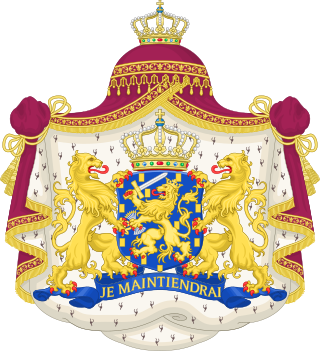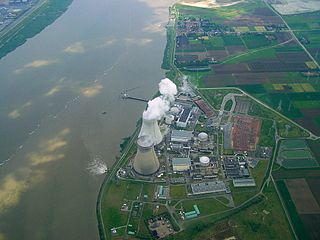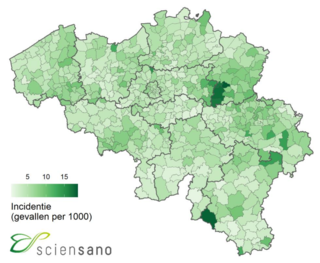
Pieter van Vollenhoven Jr. is the husband of Princess Margriet of the Netherlands and a member, by marriage, of the Dutch Royal House.

The General Intelligence and Security Service is the intelligence and security agency of the Netherlands, tasked with domestic, foreign and signals intelligence and protecting national security.

Albert Heijn is the largest supermarket chain in the Netherlands with a market share of 34.8% in 2020. It was founded in 1887, and has been part of Ahold Delhaize since 2016.
The State Security Service (VSSE) is a Belgian intelligence and security agency. Established in 1830, it is the oldest intelligence service except for the Vatican's. The State Security is a civilian agency under the authority of the Ministry of Justice, while the military intelligence agency, the General Information and Security Service, operates under the authority of the Ministry of Defense. The current Administrator-General is Jaak Raes, after his predecessor Alain Winants occupied the position between 2006 and 2014. The VSSE takes part in a number of international intelligence cooperative relationships, such as the Club de Berne and the CTG. It has contacts with over 90 sister services across four continents.

The National Institute for Public Health and the Environment is a Dutch research institute that is an independent agency of the Ministry of Health, Welfare and Sport.
The FPS Public Health, Food Chain Safety and Environment, more commonly known as the FPS Health, is a Federal Public Service of Belgium. Royal Order established FPS Justice on May 23, 2001, as part of Verhofstadt I Government to rebuild the federal administration.
The Federal Agency for Medicines and Health Products (FAMHP) of Belgium is responsible for the approval and registration of new medication in Belgium and for pharmacovigilance. Xavier De Cuyper is General Administrator of the agency.

Piet, Baron Vanthemsche is a Belgian veterinary surgeon and civil servant. In 2008, he succeeded Noël Devisch as President of the Boerenbond in Leuven.

The Doel Nuclear Power Station is one of two nuclear power plants in Belgium. The plant includes 4 reactors. The site is located on the bank of the Scheldt river, near the village of Doel in the Flemish province of East Flanders, on the outskirts of the city of Antwerp. The station is operated and majority-owned by vertically-integrated French energy corporation Engie SA through its 100%-owned Belgian subsidiary Electrabel. EDF Luminus has a 10.2% stake in the two newest units. The Doel plant employs 963 workers and covers an area of 80 hectares. The plant represents about 15% of Belgium's total electricity production capacity and 30% of the total electricity generation. Nuclear energy typically provides half of Belgium's domestically-generated electricity and is the country's lowest-cost source of power.

The Dutch Safety Board is an organisation based in The Hague, Netherlands. The first DSB Chairman was Pieter van Vollenhoven, who served from 2005 until 2011. He was succeeded by Tjibbe Joustra, who retired in 2019; he was succeeded by former Finance Minister Jeroen Dijsselbloem.
The Halle train collision was a collision between two NMBS/SNCB passenger trains carrying a combined 250 to 300 people in Buizingen, in the municipality of Halle, Flemish Brabant, Belgium, on 15 February 2010. The accident occurred in snowy conditions at 08:28 CET (07:28 UTC), during rush hour, on railway line 96 (Brussels–Quévy) about 12 kilometres (7.5 mi) from Brussels between P-train E3678 from Leuven to Braine-le-Comte and IC-train E1707 from Quiévrain to Liège. A third train was able to come to a stop just in time. The collision killed 19 people and injured 171, making it the deadliest rail accident in Belgium in over fifty years.

Healthcare in Belgium is composed of three parts. Firstly there is a primarily publicly funded healthcare and social security service run by the federal government, which organises and regulates healthcare; independent private/public practitioners, university/semi-private hospitals and care institutions. There are a few private hospitals. Secondly is the insurance coverage provided for patients. Finally, industry coverage; which covers the production and distribution of healthcare products for research and development. The primary aspect of this research is done in universities and hospitals.

The Flanders Heritage Agency is a cultural heritage agency sponsored by the Flemish Government. The organisation is split into four subdivisions; the former VIOE, which inventories Beschermd erfgoed in the Flemish Region; the agency "Ruimte en Erfgoed" which executes policy on heritage management and protection; the Ministry department of Town and County Planning, Housing Policy and Immovable Heritage, or Ruimtelijke Ordening, Woonbeleid en Onroerend Erfgoed (RWO), which supports the Minister of Culture on policy decisions; and Inspectie RWO, which is the inspection arm of the RWO.

The 2017 fipronil eggs contamination is an incident in Europe and Asia involving the spread of fipronil insecticide which contaminated human consumed chicken eggs and egg products.

Sciensano is a research institute and the national public health institute of Belgium. It is a so-called federal scientific institution that operates under the authority of the federal minister of Public Health and the federal minister of Agriculture of Belgium. Sciensano's core business is scientific research in the fields of public health, animal health and food safety. Sciensano arose in 2018 from the merger of the former Veterinary and Agrochemical Research Centre and the former Scientific Institute of Public Health. Both institutions were merged because of their complementary activities and to be able to provide a comprehensive answer to the health challenges of the future. More particularly, the merger was based on the One Health principle that states that the areas of human health, animal health and the environment are inherently connected with each other. The merger became official on April 1, 2018.
The National Institute for Health and Disability Insurance (NIHDI) is a federal public body of social security in Belgium. Under the authority of the Belgian federal minister of Social Affairs and Public Health, it is responsible for administering the country's compulsory national schemes for health insurance and disability benefits, and manages a compensation fund for medical accidents.

The COVID-19 pandemic in Belgium has resulted in 4,682,234 confirmed cases of COVID-19 and 33,395 deaths.

Prinsenkasteel was a castle located in Grimbergen, Belgium. It was the residence of the lords of Grimbergen from the 14th Century onwards. The castle ruins are located in Prinsenbos Park.













